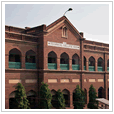Schools & Colleges
PROGRAMMES OFFERED BY NON-UNIVERSITY INSTITUTIONS |
||
 Technical College Technical College |
A Technical School, which later developed into a College, was started in 1927 for imparting training in automobile, electrical and mechanical engineering, leading to the award of diploma in the concerned branch of the Board of Technical Education, U.P. The Leather Working School, started in 1930, gives instructions in both theory and practice for manufacture of leather goods. |
|
| Centre for Applied Rural Technology |
The distinguishing feature of DEI’s Education Policy is its emphasis on combining excellence with relevance to contemporary needs of society. The Centre for Applied Rural Technology (CART) offers a large number of vocational courses through its Modular and Certificate level programmes. These programmes are employment oriented and offered at a nominal fee. By creating livelihood opportunities, CART makes a valuable contribution to the economic development and self-help. The centre is well equipped with state-of-the-art facilities to train students adequately enabling their good placement. The Centre is registered with All India Council for Technical Education (AICTE) and recognised as Skill Knowledge Provider (SKP) in the sectors of Automobile and IT upto level 5 of National Skill Qualification Framework (NSQF) / National Vocational Education Qualification Framework (NVEQF). |
|
In order to provide education to women, Prem Vidyalaya Girls’ Intermediate College was established in the year 1930. Later on, UG programmes for Women were started in the Women’s Training College in the year 1947. Moving ahead in the area of Vocational Education, DEI has established Women’s Polytechnic in the year 2004. It offers seven one-year vocational Certificate programmes to girls and women to enhance their socio-economic status. There is no restriction of age for admission in to these programmes. |
| SENIOR SECONDARY EDUCATION | |
|
(Girls only) |
His Holiness Huzur Sahabji Maharaj founded the Prem Vidyalaya in the year 1930 with 37 students, as a Middle School to exonerate the curse of illiteracy and to set an ideal of female education in the country. High school and Intermediate classes were subsequently started in 1936 and in 1939, respectively. Administrative and academic control of the College was assigned to the University by the State Government of Uttar Pradesh in the year 1995. The College has imbibed distinctive DEI education pattern. |
|
(Boys only) |
In pursuance of the lofty ideals of the Radhsoami Faith to evolve the superman of tomorrow, Radhasoami Satsang Sabha started the open to all Radhasoami Educational Institute (R.E.I.), co-educational Middle School on January 1, 1917, with classes VI - VIII and student strength of 169, that marked the genesis of education in Dayalbagh. It was recognized for High School in the year 1917 itself and in the year 1919 the first batch of the 18 boys appeared in High School Examination, out of which 17 passed. Subsequently, the School was upgraded to Intermediate College with science subjects on 3rd July 1922. The administrative and financial control of the College has been handed over recently to DEI (Deemed University) by the U.P Government vide its order dated 11/10/2012. It is recognized by the Madhyamic Shiksha Parishad, U.P. and is on the grants-in-aid list of the government. Long before the idea of work-based training was conceived anywhere else in the country; it was imparted in this College. |
|
|
Dayalbagh started its first educational institution on 1st January 1917, when “Radhasoami Educational Institute (R.E.I.)” was established, initially offering admissions from class 4 to class 8, for both boys and girls. Babu Narayan Das Sahab was the first headmaster and there were 78 students in the batch. D.E.I. P.V. Primary School today has a beautiful C shaped building painted in red and white. The school has two big adjacent play grounds equipped with swings and slides. The classrooms are big and airy and have custom made furniture. |
|
Radhasoami Adivasi Higher Secondary School, Rajaborari, M.P. (Girls and Boys both) |
The school was established as a Primary School in the year 1936 with an objective to help in the upliftment of the tribes and backward classes of Rajaborari and adjoining areas in District Harda of Madhya Pradesh. The School was upgraded to a Middle School in 1979 and gradually, into a Higher Secondary school in early 1980s. Since 2008, the academic and administrative control of the Radhasoami Adivasi Higher Secondary School and its six feeder primary schools has been taken over by D.E.I. (Deemed University), Dayalbagh, Agra. |
| (Girls and Boys both) |
The school was established as a Middle School in the year 1932 with an objective to help in the upliftment of the tribes and backward classes of Timarni and adjoining areas in District Harda of Madhya Pradesh. In 2009, Intermediate and Diploma in Engineering courses were introduced by Dayalbagh Educational Institute. |
| (Girls and Boys both) |
Envisioned by Param Guru Huzur Mehtaji Maharaj, the Soami Nagar Model School started in 1982 for Classes I-V under the Gracious Guidance of Param Guru Huzur Dr. Lal Sahab. The School has been serving the community over the years and has expanded since its founding. The Soami Nagar Pre-Primary School started as a nursery school in 1974 is a feeder school to the Soami Nagar Model School. Both the schools came under the academic and administrative control of Dayalbagh Educational Institute in 2008-09. The local support for the teaching staff and other resources is provided by the Soami Nagar Schools Society, New Delhi. A phase-wise expansion of the Soami Nagar Model School to middle level started in 2010-11, and as a result, the School had classes up to VIII by 2012-13. Subsequently, Class IX was added in 2013-14 and Class X in 2014-15 respectively. The School is expanding further with the addition of Class XI in 2015-16 and Class XII in 2016-17. |



